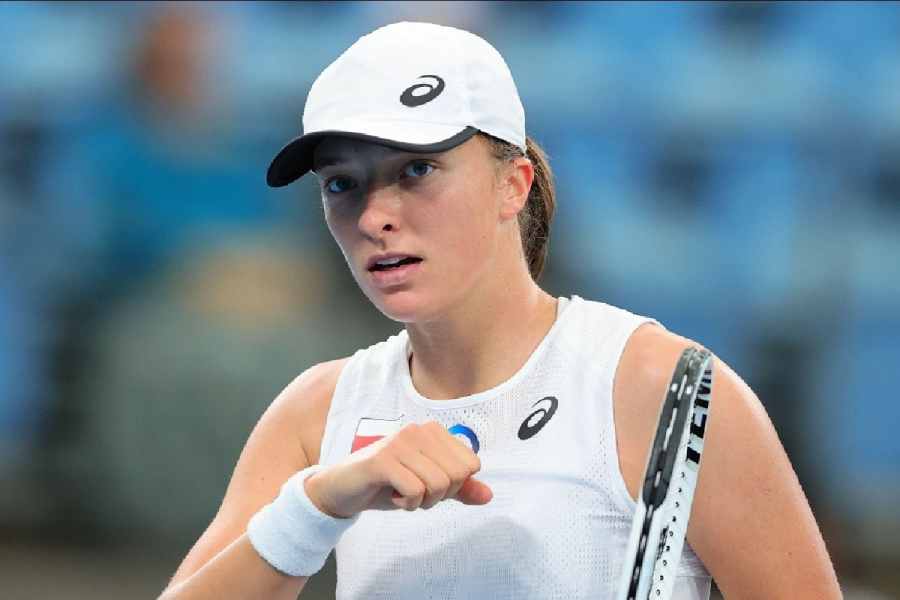When Iga Swiatek, the No. 1 women’s player in the world, took the first set against Jelena Ostapenko on Sunday night, it seemed like business as usual.
Swiatek, a four-time grand slam champion at 22, after all, was the reigning US Open champion, and going into her match against Ostapenko, she had not dropped a set at this tournament.
But although Swiatek is often able to cruise through matches, Ostapenko has been a bit of a thorn in her side. Ostapenko has been undefeated against Swiatek, and extended that to four wins with a 3-6, 6-3, 6-1 victory on Sunday night, a defeat which sees her 75-week run as world No. 1 come to an end.
Aryna Sabalenka of Belarus will take over from Swiatek when the rankings are updated on September 11 and the Pole told reporters her time at the top had been great.
Ostapenko will face Coco Gauff, the American seeded No. 6, in the quarter final on Tuesday.
Gauff ended Caroline Wozniacki’s US Open comeback with a 6-3, 3-6, 6-1 victory.
Gauff also recently figured out how to defeat Swiatek after beating her in the semi-finals of the Western and Southern Open in Ohio last month.
“It was a tough match,” Ostapenko said about her Australian Open match against Gauff earlier this year. “I don’t expect any easy matches here in a grand slam, so I’m ready for another battle.”
But now, without Swiatek in the way, the US Open women’s singles draw opens up much more widely. Suddenly, the path to the final has become easier for Ostapenko, Gauff, Jessica Pegula, Ons Jabeur and Sabalenka.
Gauff is ready for Ostapenko, whom she described Sunday as a hard hitter before Ostapenko’s victory.
“With Jelena, she’s a striker, ball-striker. I lost to her in Australian Open this year. She’s hot or cold, to be honest,” Gauff said.
The winner of Ostapenko and Gauff will take on the winner of a quarter final match between Sorana Cirstea and Karolina Muchova in the semi-finals. Cirstea, of Romania, reached the quarter finals after upsetting Belinda Bencic, the 15th seed, on Sunday. Muchova, a finalist at this year’s French Open, made it to the quarterfinals having only dropped one set in four matches.
In the second set of her match against Swiatek, the match shifted. Ostapenko began to take control. When Ostapenko evened things up at a set apiece, Swiatek seemed to be out of her comfort zone.
As she struggled, Swiatek looked up at her box, appearing to ask for some sort of advice to contend with Ostapenko’s surge. Her coach, Tomasz Wiktorowski, didn’t seem to have an answer for her, and Swiatek sarcastically clapped toward her box, as if to convey thank you for nothing.
Throughout the third set, Ostapenko was unrelenting. “I had to be aggressive because that’s what she doesn’t really like,” Ostapenko said in an on-court interview after the match. “I was just fighting until the very last point.”
Without Swiatek in the way, the US Open women’s singles draw opens up much more widely. Suddenly, the path to the final has become easier for Ostapenko, Gauff, Jessica Pegula, Ons Jabeur and Aryna Sabalenka.
The winner of Ostapenko and Gauff will take on the winner of a quarter final match between Sorana Cirstea and Karolina Muchova in the semi-finals. Cirstea, of Romania, reached the quarter finals after upsetting Belinda Bencic, the 15th seed, on Sunday. Muchova, a finalist at this year’s French Open, made it to the quarter finals having only dropped one set in four matches.
For now, Ostapenko is focused on Gauff, whom she expects to pose a difficult challenge. “I will try to focus on myself and enjoy it,” Ostapenko said.
Eyes on reset
An exhausted Swiatek said she would try to “embrace” the pressure a bit more.
Swiatek inherited top spot following Ash Barty’s retirement in April 2022 and embarked on a superb run of form in the months that followed to claim three more Grand Slam titles after her breakthrough French Open success in 2020.
The 22-year-old’s consistency meant only two other women have held the No. 1 ranking for more consecutive weeks in their first stints at the top — Steffi Graf (186) and Martina Hingis (80).
“Usually I’m not looking at numbers, but overall I love them,” said Swiatek.
“I’d love to extend this record a little bit longer. When I was younger, I wanted to break some record or have something. I already did that because I already won a grand slam as a first Polish player.
“Obviously being No.1 as the third player in history is great. But for sure when you lose it there are some sad emotions.”
Swiatek said she has made progress as a player but this season had been “really tough and intense” and she said she hoped to return stronger.
“When I’m going to be next time in the same situation, I’m going to do some stuff differently because,” Swiatek said.
“Tennis is stressful overall, but I should embrace it a little bit more. I’ll do it differently next time, so I guess that’s positive.”
New York Times News Service, Reuters











